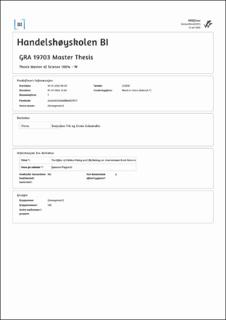The Effect of Politics-Policy and ESG Ratings on International Stock Returns
Master thesis

Permanent lenke
https://hdl.handle.net/11250/3037407Utgivelsesdato
2022Metadata
Vis full innførselSamlinger
- Master of Science [1621]
Sammendrag
First and foremost, our study provides evidence of a relationship between a country’s
returns and its Politics-Policy ratings. We document that the univariate spread portfolio
that is long on the low politics (policy) portfolio and short on the high politics
(policy) portfolio generates a statistically significant return of 6.77% (6.50%). We identify
a global political risk factor, the P-factor, that produces a statistically significant
return of 10.22%. This P-factor captures common systematic variation across countries
leading to priced global political risk. We demonstrate that the P-factor is priced in the
market with a risk premium of 7.24% for the unit exposure to the P-factor risk. Second,
we investigate the relationship between a country’s returns and its ESG rating. We
do not find any statistically significant relationships, in the spread portfolios, over the
whole sample that covers 1995-2019. Still, we are able to find a relationship between
country returns and ESG ratings after controlling for country characteristics. However,
from 2000 to 2010, we do find a number of statistically significant relationships
in the spread portfolios. In particular, over this period, the return on the portfolio
of the low-rated countries was statistically significantly higher than the return on the
portfolio of the high-rated countries. We show that an improvement in ESG ratings
negatively impacts a country’s stock market returns. Our results also suggest that high
Policy-Politics ratings tend to cause high ESG ratings. Further, we document that the
country’s ESG rating affects the country’s GDP growth rate and vice versa. Then, we
find that the spread portfolio of High political risk countries generates a positive and
statistically significant return. Finally, we demonstrate that countries that improve
(worsen) their ESG ratings tend to produce higher (lower) returns.
Key words: political uncertainty, policy uncertainty, international equities, asset
pricing, ESG rating
Beskrivelse
Masteroppgave(MSc) in Master of Science in Business, Finance - Handelshøyskolen BI, 2022